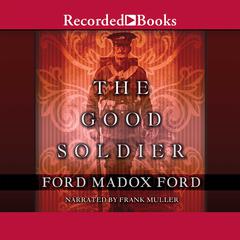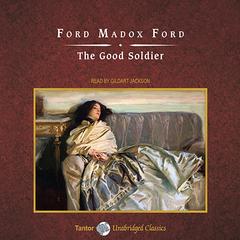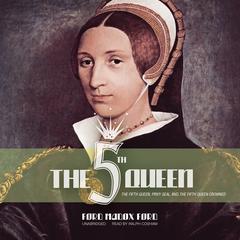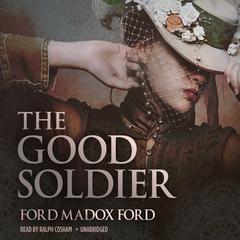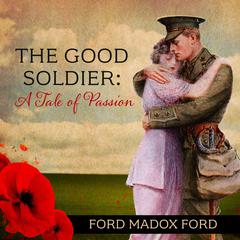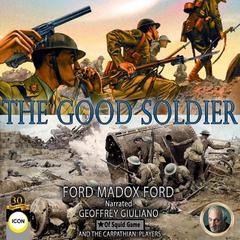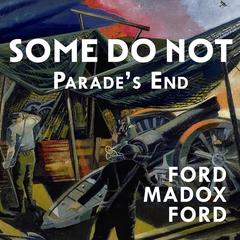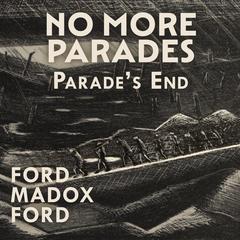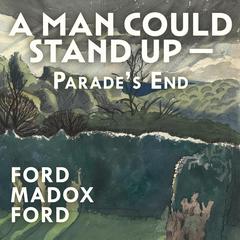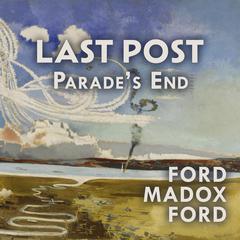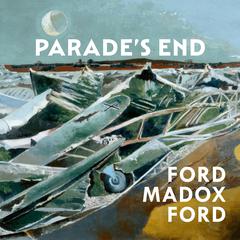 Play Audiobook Sample
Play Audiobook Sample
Parade's End Audiobook
 Play Audiobook Sample
Play Audiobook Sample
Quick Stats About this Audiobook
Total Audiobook Chapters:
Longest Chapter Length:
Shortest Chapter Length:
Average Chapter Length:
Audiobooks by this Author:
Publisher Description
Ford Madox Ford’s World War I masterpiece Parade’s End is now available on audio for the first time ever!
Ford Madox Ford’s tetralogy set in England during World War I is widely considered one of the best novels of the twentieth century.
First published as four separate novels (Some Do Not…, No More Parades, A Man Could Stand Up, and The Last Post) between 1924 and 1928, Parade’s End explores the world of the English ruling class as it descends into the chaos of war.
Christopher Tietjens is an officer from a wealthy family who finds himself torn between his unfaithful socialite wife, Sylvia, and his suffragette mistress, Valentine. A profound portrait of one man’s internal struggles during a time of brutal world conflict, Parade’s End bears out Graham Greene’s prediction that “there is no novelist of this century more likely to live than Ford Madox Ford.”
Download and start listening now!
"An astounding work of art. Ford's writing is incredible: he excels at both writing a cohesive and paced whole and delivering incredible language sentence-to-sentence. Ford is, above all, a patient writer, and the result is an incredibly controlled work that delivers its aesthetic blows neither before nor after they are appropriate but precisely when they are best suited. With Ford, it isn't so much that the events in the story give meaning to the overall situation but that the situation gives meaning to the events: the atmosphere at a particular moment - prewar, war, postwar - pours into it a new potency of meaning that may not have been otherwise observable. The result, from a reader's standpoint, is that Tietjens is not somehow microcosm for the British war experience but that the Great War is one imposing force among many parallel ones. It is this quality of the assault against Christopher, its being a multitude of aligned forces, which makes the novel so devastating. The story is tragically beautiful, and the language is written to match. Each of the central characters (and, for that matter, most of the minor characters as well) feels incredibly authentic, their concerns intimate to the reader; a character (notably, even Sylvia) never feels an emotion without both understandable motivation to do so as well as doubts or regrets concerning it. As with the greatest works of other great authors, every word of Parade's End is purposefully - and successfully - placed. It will take time and review to ascertain this novel's proper place on my bookshelf, but I feel safe in saying that it is as worthy a contender for best novel I've read as any other since Absalom."
— Alex (5 out of 5 stars)
Quotes
-
“There are not many English novels which deserve to be called great: Parade’s End is one of them.”
— W.H. Auden -
“The terrifying story of a good man tortured, pursued, driven into revolt, and ruined as far as the world is concerned by the clever devices of a jealous and lying wife.”
— Graham Greene -
“Possibly the greatest 20th-century novel in English.”
— John N. Gray
Parade's End Listener Reviews
-
" This book is really a collection of four shorter novellas. I am giving the five star rating based on the first two books, Some Do Not and No More Parades, though the quality drops off somewhat for the other two. The quality of Madox Ford's writing is superb and the stream of consciousness strolls through the main character's thoughts are intriguing. Christopher Tietjens is a turn of the 20th century English gentlemen, with all the infuriating mindset that position implies. Despite being frustrated at the main character's lack of action towards what will make him happy, I found it refreshing to be inside the thoughts of such an intelligent mind. There is one passage in the third book where Christopher is musing on the fact that he just wants someone to talk to, and if that means he has to live with the woman he is obsessing about and to seduce her, that's a byproduct of the fact that they'll get to keep on conversing. That bit of thought seems to sum up his character, an intelligent, lonely man looking for someone who can relate to him. Tietjens' psychopathic wife adds spice throughout the books, and the third book provides a first hand account of an English officer's life in France during WWI. I really can't express my love for this book enough, other than to say it's one of the best I've read in years. "
— Colette, 1/23/2014 -
" Amazing insight into British society and the English mind around WW1. I read this for one of my MA classes (and re-read for an essay and then re-read yet again) and since have read several others books by Ford, a forgotten great hopefully coming back to the forefront with the new BBC/HBO miniseries, though I think this book is too difficult for most casual readers that will come to it from the miniseries. The time shifts are initially confusing, but when one lets yourself go (I think the confusion the reader feels is intended, it mimics the confusion the characters feel), one discovers great comic moments (the breakfast scene at the Duchemins in particular), a beautiful love story and a very sympathetic hero of the stiff upper lip variety, and one of the most despicable yet fascinating characters you're likely to encounter in literature. If you're not sure that you can commit to the full book, read Some Do Not.... This is a self-contained book in it's own right--if you finish it wanting to know what happens to the characters, then by all means read on. But it's in my mind easily the strongest of the four books--most comic and best use of modernist techniques, namely the time shift (which Ford coined). "
— Kristin, 1/21/2014 -
" Only read the first one and half of four novels - I understand it's downhill, but I'm actually enjoying this, which is a nice change of pace given the course reading. "
— Paul, 1/14/2014 -
" Its good - but so longwinded, gave up after 400 pages. "
— Justin, 1/5/2014 -
" It took me long to finish the book. The story line is a bit confusing because of the time shifts. The war part and the battlefront scenes are not persuasive. It is about the dying of the old "ancient regime" when clashing with the new world order influence. Nevertheless I give the book 4 stars "
— Jernej, 12/27/2013 -
" Terrific! In this day and age when everything is sound bites, quick reads, and info overload, it's great to slow down and really savor words and really get to know the characters in a book. Pleasurable reading! "
— Alan, 12/24/2013 -
" Stamina needed to get through all 4 volumes but worth it. "
— Sonia, 9/10/2013 -
" One of my favorite novels, and one of the books that I continue to dip back into every six months to a year. It's almost unique in my experience in that the main character changes almost not at all while the world falls apart around him. "
— Frederick, 8/8/2013 -
" Loved and adored this book. "
— Lynda, 5/19/2013 -
" Stopped reading for the mo as having to concentrate on MA books - hoping to restart in September. "
— Jenny, 5/8/2013 -
" Hard to get into but worth the effect. Absolutely moving and impressive. Wonderful. Makes you laugh, cry, draw back in horror. "
— Chris, 3/13/2013 -
" Looong book. The first book of the group was very good, the second OK, the third interminable and the fourth and last relatively interesting. All the stream of consciousness told through the eyes of someone with PTSD got old after a while. "
— Melinda, 3/8/2013 -
" I can't wait to read this again... after 30 years... and I can't wait to see Tom Stoppard's screenplay! "
— Sarah, 1/25/2013 -
" The most wonderful, wonderful thing. "
— Meredith, 12/26/2012 -
" This book was terminally dull and incomphrensible in some places. Stick to the tv version with Benedict Cumberbatch. "
— Samantha, 10/9/2012 -
" My personal choice for greatest English novel. Read before you watch HBO's adaptation. I fear they may Downton it. "
— Gregory, 9/2/2012
About Ford Madox Ford
Ford Madox Ford (1873–1939) was a novelist, poet, literary critic, editor, and one of the founding fathers of English Modernism. He published over seventy books in his lifetime, perhaps most famously The Good Soldier. His books often centered on the conflict between traditional British values and those of the modern industrial society.
About Steven Crossley
Steven Crossley, a graduate of the Royal Academy of Dramatic Art in London, has built a career on both sides of the Atlantic as an actor and audiobook narrator, for which he has won more than a dozen AudioFile Earphones Awards and been a nominee for the prestigious Audie Award. He is a member of the internationally renowned theater company Complicite and has appeared in numerous theater, television, film, and radio dramas.




